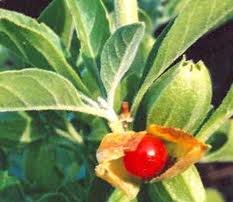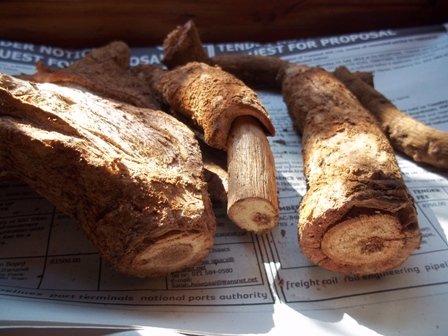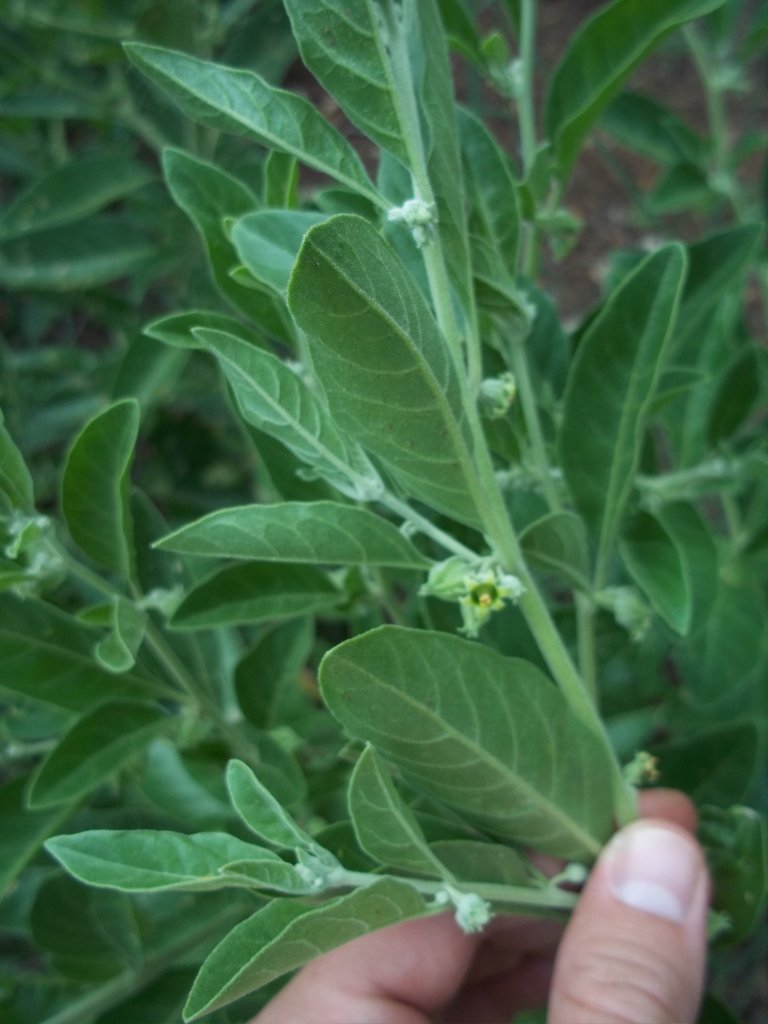
I've chosen to start my medicinal plant Factsheets with Withania somnifera or Ashwagandha in Indian Ayurvedic medicine because of its intense power as a 'balancer' for various conditions.

I came to know Ashwagandha through my herbal passion and digging the roots out and experimenting with them as a young herbalist. It grows in the mountains here in South Africa-being naturalized.
Its power as a relaxant I found through many peoples reports of it helping them cope with intense stress to the point they feel ok about serious issues - don't we all need that! It also was a key ingredient in an ayurvedic formula I used to help me ground through a period of exhaustion. It works well but care is needed in its use.
So below is the information I compiled.
Its ethnic names here are ubuvimbha (Zulu); ubuvuma (Xhosa); bofepha (Sotho); geneesblaarbossie (Afrikaans); winter cherry, ashwaganda (Indian)
ORIGIN: Indigenous to South Africa, also found in southern Europe and Asia (used in Indian Ayurvedic medicine).
GROWTH
Small shrub-perennial. Propagation is from seed, sown in deep sandy soils. Full sun. Grows as weed in disturbed ground and is often found growing between rocks (rocky habitats-“koppies”). The leaves are harvested in spring, and the fruit and root in autumn (Chevallier, 1996).

PARTS USED
Leaves and roots
MEDICINAL USES
Externally, leaves are commonly used as a poultice, or paste, for sores and wounds, rheumatism, inflammation. It is also applied as a paste to venereal diseases. It heals slow healng wounds externally
Internally, infusions (tea), decoctions and tinctures of the fresh roots are taken orally in South Africa for fevers, colds and flu’s, asthma, general ill health and debility, any infections, syphilis, diarrhea, typhoid, proctitis, worms, and as a sedative (Van Wyk and Gericke, 2000). Activities: Tonic, anti-biotic, anti-inflammatory, anti-stress, immuno-stimulant, and anti-cancer.
PREPARATION AND DOSAGE
External use on skin: Make paste of leaves, or use the leaves as a poultice.
Make ointments with fat or oil.
Internal use: Roots are made into tea, boiled into a decoction, or soaked in alcohol. For older roots use the soft outer bark, not the core. The root bark is most commonly used, half a teaspoon of finely ground root taken once a day with water, or 5 teaspoons in 100ml boiling water prepared as an infusion, take 1 tablespoon, 3 times daily. Use symptomatically (in cases of exhaustion/stress/fatigue) as a tonic.
WARNING!
Do not eat the leaves or the berries as they are toxic. Caution when taken together with sleeping tablets or tranquilizers as the plant can increase the effects of other depressant drugs. Causes drowsiness so do not drive or operate machinery after taking the medicine internally.
Ashwagandha is an amazing tonic root-called horse smelling root in chinese medicine-because of its alkaloids, that can be used to balance autoimmune conditions like lupus and major stress and sleeping problems.
Grow this herb as a powerful ally against lifestyle diseases.
Be sure to catch my next Medicinal Plant Factsheet on Yarrow-the Herb that healed Achilles Heel
&
To Learn More about the Healing Properties of other Tonic Plant Foods, Herbs and Spices See My New Online Psychoactive Plants and Food as Medicine Courses here: https://www.phytoalchemy.pro/

References
Chevallier, A. 1996. The Encyclopedia of Medicinal Plants. Dorling Kindersley. New York.
Van Wyk, B.-E., Van Oudtshoorn, B., and Gericke, N. 1997. Medicinal Plants of South Africa, Briza Publications, Tshwane.
Van Wyk, B.-E., and Gericke, N. 2000. People’s Plants. A Guide to Useful Plants of Southern Africa. Briza Publications, Tshwane.
well researched
The @OriginalWorks bot has upvoted and checked this post!
Some similarity seems to be present here:
http://herbgarden.co.za/mountainherb/article.php?tag=Ashwaganda
This is an early BETA version. If you cited this source, then ignore this message! Reply if you feel this is an error.
Thanks Pharmacy jinni :D
Awesome post! Loved reading about this herbal remedy. Alternative medicine certainly has some merit, however I do continue to remain skeptical.
Hi Extreme many plants have legit uses-far more cred than homepathy-thats for sure. :D
I studied some homeopathy pretty recently. It's a very interesting concept, but the amount of actual substance in each remedy is so minute that it's literally a strong placebo.
However, herbal remedies actually have compounds that could cause their profound effects, which is why you shouldn't mix herbals with pharmaceuticals.
one has to be careful Extreme :D yes
Thanks :D